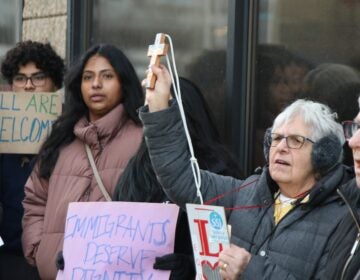Celebrating tradition — and a southeastern Chinese god’s 1,189th birthday — in Philly
Some attendees came by the busload from Washington, D.C. and New York City to attend Philly’s eleventh Chinese Hoyu Folk Culture Festival.
Listen 2:19-

Zhang Wen tosses lit firecrackers into a barrel as part of the Hoyu Folk Culture Festival parade in Philadelphia's Chinatown on Sunday, March 31, 2019. (Kriston Jae Bethel for WHYY)
-

Festival-goers light incense that they will use as an offering to honor their ancestors at the Hoyu Folk Culture Festival in Chinatown on Sunday, March 31, 2019. (Kriston Jae Bethel for WHYY)
-
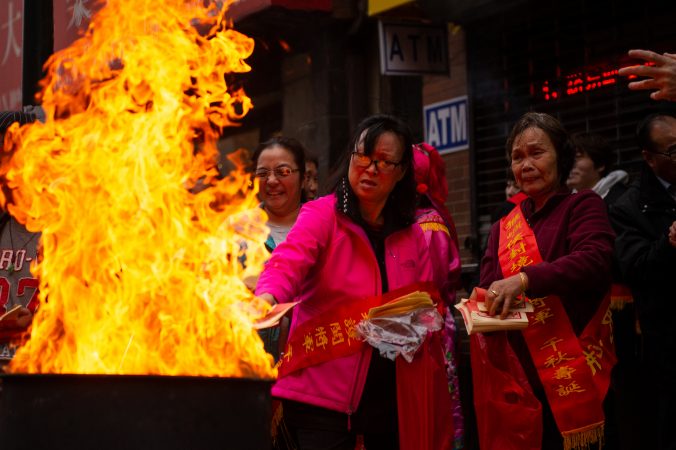
Festival-goers toss paper money into flames as a way to honor their ancestors during the Hoyu Folk Culture Festival in Chinatown on Sunday, March 31, 2019. (Kriston Jae Bethel for WHYY)
-

An effigy of General Humin is flanked by two others, as festival goers offer incense during the Hoyu Folk Culture Festival in Chinatown on Sunday, March 31, 2019. The festival celebrates the more than 1,000th birthday of General Humin, said to have been a scholar and a fighter, who helped build the city of Fuzhou. (Kriston Jae Bethel for WHYY)
-
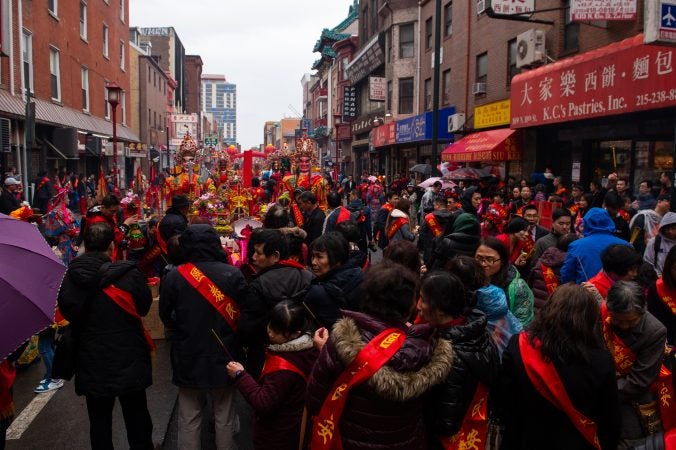
Attendees of the annual Hoyu Folk Culture Festival in Chinatown on Sunday, March 31, 2019. (Kriston Jae Bethel for WHYY)
-

A man plays horn while participating in the Hoyu Folk Culture Festival parade in Chinatown on Sunday, March 31, 2019. (Kriston Jae Bethel for WHYY)
-
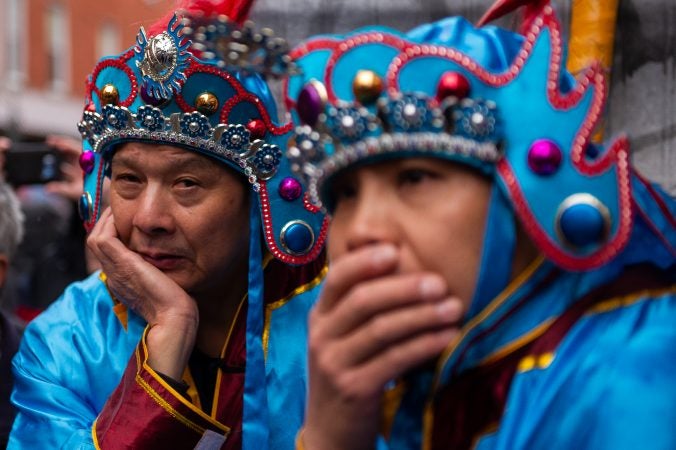
Wearing costumes of their own, two men watch a traditional Chinese opera performance during the Hoyu Folk Culture Festival in Chinatown on Sunday, March 31, 2019. (Kriston Jae Bethel for WHYY)
-

An actor performs in a traditional Chinese opera during the Hoyu Folk Culture Festival in Chinatown on Sunday, March 31, 2019. (Kriston Jae Bethel for WHYY)
Hundreds of people came to Philadelphia’s Chinatown Sunday — many by the busload from as far as Washington, D.C. and New York City — to celebrate a southeastern Chinese god’s 1,189th birthday.
The god was General Humin, whom worshippers credit with bringing prosperity to China’s Fujian Province during the 10th century by opening the ports and building schools. That’s according to organizers of the Chinese Hoyu Folk Culture Festival, named for a township in Fujian.
The general was elevated to god status after his death and is seen as a protector of the Fujian Province. During the festival, the general and other local gods are celebrated with fireworks, music, and burned silver-and-gold covered papers representing money.
“This is very Chinese traditional culture,” said Steven Zhu, 50, who’s lives in Philadelphia. “They pray for their ancestors, pray for their villages … and [the] whole community.”
As they marched through Chinatown, attendees young and old said they long for the seaside coasts of Fujian Province, which sits on the southeastern part of the country with warm weather comparable to Florida’s.
For many, Philadelphia’s Hoyu festival, now in its eleventh year, is one way to stay connected with others from that region of China — and to ensure that knowledge of the local gods is passed on to future generations.
Organizers of the festival — which features lion dances, chinese opera, and prayers with incense — say Philadelphia has an active community of immigrants from Fujian.
They estimate 1,000 people here have connections to that part of China, and that’s allowed them to build a temple here that celebrates the gods of Fujian, which cities with greater numbers of expatriates have not.
Still, even with an active community, many younger people from Fujian say the future of celebrations like these in the United States is tenuous.
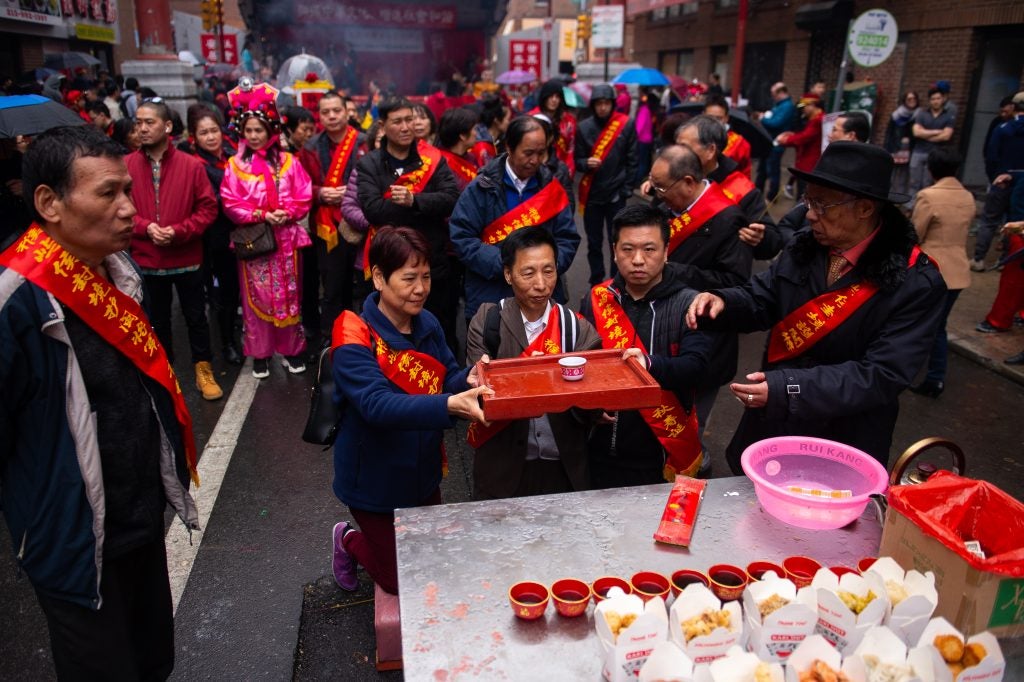
“A lot of tradition, it got passed, it got lost, from generation to generation,” said Wei Zhang, of Philadelphia. “So I’m not sure if next generation will be able to carry this kind of tradition anymore.”
Zhang hasn’t gone back to his hometown of Hoyu in the 20 years he’s been living in the United States, but he said he’s doing his best to keep at least this tradition of attending the Hoyu Festival alive.
Still, he and several of the other younger attendees were quick to say they don’t know all of the more than a dozen deputy generals and gods on display at the festival. They just know they’re there to be with family and to ask for good luck.
“It’s hard to carry on because the new millennials don’t want to do this anymore,” Zhang said.
Wei Chen, who came to the United States from Fujian 10 years ago when he was 16, understands this dynamic firsthand. In particular, Chen worries his hometown’s dialect is going extinct because there’s no school that teaches it. The only way young people can learn it is from the older generations and speaking it every day.
Though he no longer feels as homesick as he once did, Chen doesn’t want to lose his connection to his roots.
“I love this town now, I love my city now, I want to contribute as much as I can to the city, but at the same time, I should not forget my heritage,” Chen said. “So my role is to be a peacemaker between my hometown, my village, and this country.”
Chen is one of the young people more familiar with the different roles of the gods — one protects fishermen, another infants and their mothers — and he’s more than happy to share what he knows.
For Yan Juan Jiang, a first time attendee who made the trip from Brooklyn, the three-hour drive was also more practical.
Jiang said she flew to China with her husband for the festival last year and while that celebration had hundreds more people and much more food, it was also expensive to fly there.
Ultimately, she said this is the closest gathering for her to see other people from Fujian Province and other members of the community also join the fun.
“Just here in Philadelphia, not anywhere else,” she said. “Anybody can come here.”
WHYY is your source for fact-based, in-depth journalism and information. As a nonprofit organization, we rely on financial support from readers like you. Please give today.



